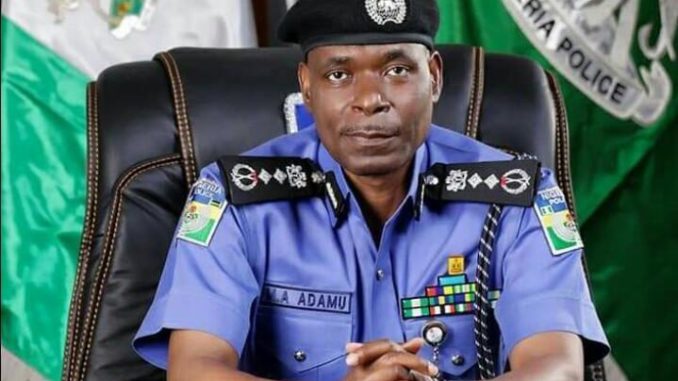
FOR Mohammed Adamu, who was confirmed as the 20th indigenous Inspector-General of Police, the attainment of the top professional police position may turn out to be bitter-sweet. At no time in Nigeria’s past, bar the Civil War, has insecurity stretched the resources of the state and threatened its corporate existence as today. Taking the hot seat that overwhelmed his predecessors will require uncommon administrative and professional ingenuity from Adamu.
Can he make a difference? Going by the sorry record of the force he heads and the prevailing political leadership, the omens are not promising. Crime, terrorism and impunity have conflated with a deteriorating institutional capacity and corrosive corruption that render the citizenry helpless and vulnerable. Nigeria is a failing state and analysts fear that it could easily plunge into the precipice.
As he set about the task, he will bear in mind the figures he gave a month ago that 1,071 persons were murdered in the country in the first three months of this year. Some 685 persons were kidnapped within the same period with 212 major armed robbery cases. Unofficial figures are by far higher as many crimes go unreported. For instance, Open Doors, an NGO, claimed that in April, over 40 persons, many of them children, were killed by armed marauders in Nasarawa, Benue and Gombe states. The Nigeria Security Tracker, a data-based catalogue run by the Council of Foreign Relations, a US think tank, identifies Boko Haram and ISIS affiliates, state actors, sectarian militants and criminals as the culprits rampaging through the country and spilling rivers of blood with impunity. Most deadly these days are Fulani herdsmen/militants who have fanned out all over the country, burning, pillaging and raping at will. The Global Terrorism Index said Fulani herdsmen killed six times more people than Boko Haram in 2018. The Fulani tally of 1,700 persons killed between January and September of that year established its global notoriety as the world’s fourth most deadly terrorist group.
As kidnappers, armed robbers, street gangs, cultists and rapists stalk the land, heavily armed bandits have spread out in the North-West region, just as Boko Haram terrorists and Fulani militants have turned the North-East and the North-Central states into killing fields. Bandits, their ranks swelled by cross-border outlaws, have rendered parts of Zamfara, Katsina, Kaduna, Sokoto and Kano states unsafe for travel, farming and other economic activities. Kabiru Marafa, a senator, says bandits killed 11,000 persons between 2011 and this year. Adamu’s figures indicate that Zamfara tops the national kidnap industry with 281 persons abducted in the three months to March this year. Piracy on Nigeria’s coast is rising, fuelled by the industrial scale theft of Nigerian crude, according to the International Maritime Bureau’s Piracy Reporting Centre, while Niger Delta militants, illegal bunkering syndicates and vandals ruptured 257 pipeline points in December 2018, up from 197 in November. In the South-West, road transport union-affiliated thugs, street gangs and hoodlums regularly render cities and rural areas unsafe, while rape and highway lawlessness have spiked.
Adamu’s task is made even more difficult by pervasive corruption, under-funding and under-equipping of the force, as well as by political interference and a central policing system that is anachronistic and self-defeating. First, Adamu must instil discipline in the officers and rank and file. The average Nigerian police officers encountered by the citizen are rude, often violent, corrupt and inefficient, the very anti-thesis of a law enforcement officer. He should get serious about corruption to erase the agency’s dubious distinction as the most corrupt in the country. He should initiate zero tolerance for corruption and abuse of human rights by police officers.
Nigerians will take him on his word to accord priority to community policing; this is the way to go. While the country works to amend the 1999 Constitution that vests policing in the Federal Government exclusively, he should borrow from a unitary state like the United Kingdom that nevertheless makes community policing the bedrock of its acclaimed public safety system. His recent roll-out of a phone-based application for all citizens to facilitate rapid police response to crime scenes is promising. Successful crime prevention, says the Organisation of Security and Cooperation in Europe, “requires shared commitment and ownership by police and the public.” Modern policing also relies on intelligence and deployment of technology tools to meet the challenges posed by today’s adaptable criminals. His promised plan to revamp the police with emphasis on “quality leadership” and the welfare of his personnel should be followed through: better pay, kitting and equipment should be his priority too.
Adamu will demonstrate his seriousness if he can quickly withdraw the estimated 150,000-200,000 personnel on bodyguard duties out of a force strength put at 334,000 by his immediate predecessor. So stretched has the Nigeria Police become that military personnel are active in crime control in 31 of the 36 states, often being the first line of contest instead of the police. This is unfair, irrational and unsustainable. He should, in conjunction with the Police Service Commission, undertake a biometric census to determine the precise number of personnel. He should shake up the force that needs total reform, put his commanders on their toes, set targets and be swift and unsparing in dishing out punishment to errant officers. He should immediately map out proactive plans to tackle banditry, kidnapping, gangland crime and mop up the massive quantum of illicit arms.
Ultimately, Nigeria must quickly change the policing template to allow for state police that President Muhammadu Buhari has finally expressed support for, a major development for a country in crisis. Tackling the security challenges now and into the future demands no less, especially in a federal polity such as Nigeria.
END

Be the first to comment